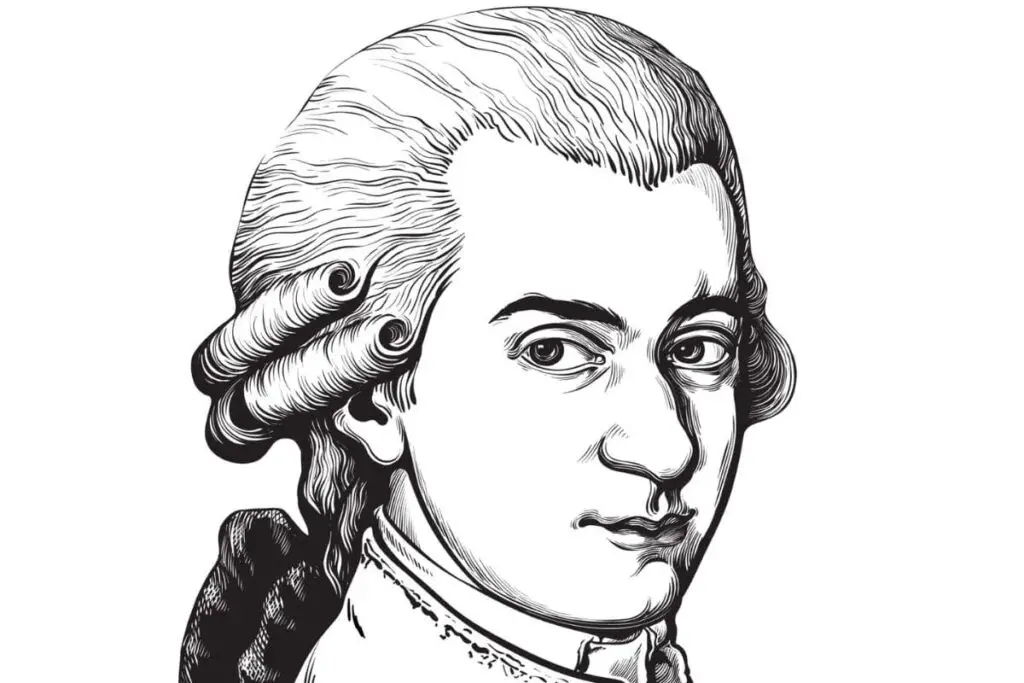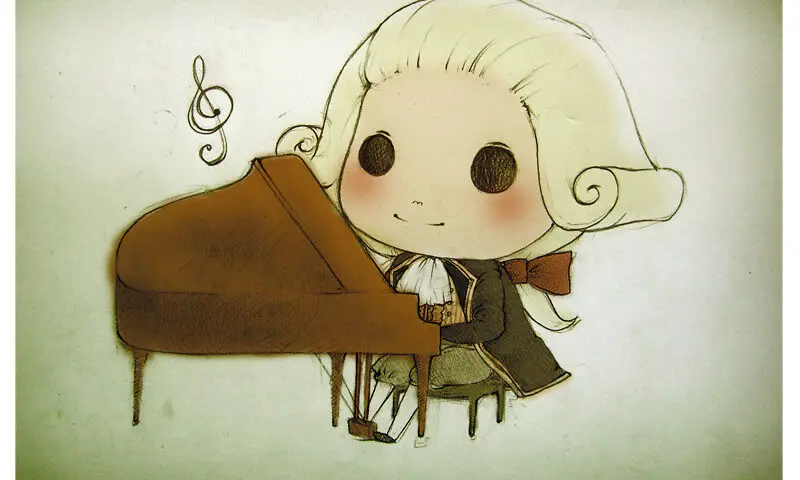For centuries, the world has revelled in the works of talented composers such as Chopin, Beethoven, and Tchaikovsky. However, there is one composer whose technical craftsmanship surpasses that of his peers, making him the greatest musical genius of all time.
Wolfgang Amadeus Mozart is the greatest musical genius of all time. He created masterpieces from every music genre, from operatics and symphonies to concertos and chamber music. With near-perfect precision, he incorporated emotion and drama into all his pieces, maintaining an unmatched versatility.
With instantly recognisable melodies, even by those who don’t consider themselves music lovers, Mozart’s impact on the world was immense. Even some of the most talented composers hailed Mozart as the best and a significant source of musical inspiration. This article shows that Wolfgang Amadeus Mozart was legendary musical genius.

The Makings of a Musical Genius
Wolfgang Amadeus Mozart’s Early Years
Wolfgang Amadeus Mozart was born on January 27, 1756. His parents were composer and violinist Leopold Mozart and Anna Maria Pertl. Wolfgang’s father, Leopold, was a well-trained musician, though he was not the masterful composer that his son would later become.
Leopold provided his son Wolfgang and daughter Maria Anna (Nannerl) with excellent musical and academic education. As a toddler, Wolfgang could play the piano; by age five, he had written several minuets.
Becoming a Child Prodigy
When Wolfgang was nine and his sister fourteen, their father, Leopold, set out to introduce the world to his child prodigies. The siblings set out with their father, touring Europe and performing for nobility, including the king of France and King George III.

Though Wolfgang’s sister was talented on the harpsichord, it was the young Mozart who stood out. He showcased phenomenal talent with an ability to read music with little effort and improvise on cue. However, it was also his elegance, self-assuredness, and charm that drew in onlookers.
Young Mozart had an undeniable presence and was even somewhat intimidating. Despite being a child, he appeared stern, stoic, and serious. While playing, he sat straight and stony-faced yet seemed fully aware of the incredible impact he had on the crowd. It seemed clear from a young age that he would become the greatest musical genius of all time.
Young Mozart’s Tavern Performances
Leopold beamed with delight at young Mozart’s musical capabilities and even more so at his son’s success. He later pushed his children to perform among commoners in a London tavern to raise funds. Little did Leopold know this would lead young Mozart to great struggles later in life. However, it may have also played a role in his musical genius and reputation as a legendary composer.
Performing among commoners didn’t go over well with the aristocracy, who saw it as betrayal. They had been generous to Leopold and the Mozart children, offering gifts and goods to watch the youngsters perform. After Leopold offered their talents to the middle class — in a tavern, no less — the family became a disgrace. The courts of Europe looked down upon Leopold and his children as beggars.
Mozart’s First Rejection

Despite his genius-level musical talent, being shunned by Europe’s nobility caused Mozart great anguish. The beggar label left him feeling vilified.
There may have even been unexpressed bitterness towards his father and the royal courts. After all, many of his peers in music had achieved financial success through well-paid positions as court musicians. Yet, there he sat, a musical genius rejected due to no fault of his own.
Mozart’s Disenchantment Created a Musical Genius
Since he could not land a position with the court, Mozart had to depend on the public for financial support. Though it left him feeling disenchanted, this is likely what led him to become the greatest musical genius of all time.
Well-paid positions among royalty would have limited Mozart’s exposure to the general public. This could have limited his ability to create new, fresh compositions.
On the contrary, his humble beginnings required him to dig deep and locate an ideal balance between convention and creativity. He had to put his genius-calibre compositional skills to work whilst combining them with a modest need to survive. And, he couldn’t waste energy on novelty performances. He had to focus on creating the best.
4 Reasons Wolfgang Amadeus Mozart was a Musical Genius
Wolfgang Amadeus Mozart had a gift — this is undeniable. He wrote three symphonies and his first operatic work, La Finta Semplice (The Simple Pretence), by middle-school age.
During his teenage years, he mastered multiple instruments and became the concertmaster at the orchestra of the Archbishop of Salzburg in Vienna.
However, it is not just his accomplishments at a young age that make him the greatest musical genius of all time. It is his masterful compositions across every genre, timing, emotion, and drama, impeccable precision, and unmatched musical versatility.
Let’s look at the reasons Wolfgang Amadeus Mozart was a musical genius:
1. Mozart Composed Across Genres
A skilled master of composition, Mozart created works in every musical genre, from opera to concertos and symphonies to sonatas. Beyond this, he composed solos for every instrument available during his lifetime.
When Mozart combined two solo instruments with the backing of an orchestra, it created an extraordinary piece of music that inspired people.
Hear an example of this combination in the opening of Mozart’s Sinfonia Concertante, performed by the New England Conservatory Chamber Orchestra:
2. Mozart Perfected Timing, Emotion, and Drama
Mozart understood the importance of timing and incorporated emotion and drama into his works. This was especially clear in his operatic compositions.
For example, in Don Giovanni, during the Commendatore scene, Mozart creates an overwhelming atmosphere of terror. However, there’s also a touch of comedy. This is all done through timing, lyrics, and musical composition to create drama and evoke emotion. The result is a haunting performance that is incredibly moving.
See the climax of Don Giovanni starring Samuel Ramey (spoiler alert — this is the end of the final act):
3. Mozart Had Impeccable Precision
Though Mozart only lived to be 35, he composed at least 626 musical works throughout his lifetime. His ability to create so many masterpieces is attributed to his ability to compose with impeccable speed and precision.
Despite producing works in as little as a few hours, they rarely required revision. When he transferred work from his mind to paper, it was clean and error-free, as though he had perfectly memorised it. This is more evidence proving he deserves the title of the greatest musical genius of all time.
This is in stark contrast to other composers, such as Beethoven. Beethoven had compositions so sloppy and unintelligible that they had to be deciphered by professionals.
4. Mozart’s Music Features Unmatched Versatility
Thanks partly to his father’s insistence on touring his children at a young age, Mozart was well-travelled as a child. In addition, he spent a lot of time travelling Europe as an adult.
Through his travels, he picked up various musical styles and sounds and incorporated them into his own compositions. This allowed Mozart to transform his work in new, exciting ways, and create the unique and timeless music we continue to enjoy today.

